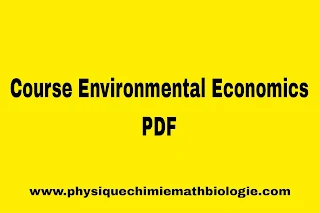Course Environmental Economics PDF
1.Introduction:
In the early tradition of economic thought, laid down by the classical and neo-classical economists, economics was conceived as the study of the allocation of scarce resources among alternative, competing ends, in the quest to satisfy human wants. The classical and neo-classical economists underestimated the environmental issues of production and consumption, since they considered these as social issues. Consequently, the impacts of production and consumption on the natural environment were not explicitly brought into the mainstream of economic theory. The environment was taken as given and can last ad infinitum.

Course Environmental Economics PDF
However in the early 1970s, the reality of economic thought brought to a halt the perception of economics merely as a science of production and distribution. In the new thinking, economics is no longer perceived as the science of production and distribution which neglects the environmental repercussions of economic activities. This means that economics as a subject cannot exist in isolation. It must take into consideration the effects of resource use in production and distribution on the natural environment which supplies these resource inputs. Thus, any study on the economic content of production, distribution, consumption, development etc cannot be completed without touching upon the environmental aspects like pollution of the environment (e.g water and air pollution), environmental damage, environmental resource exhaustion and depletion, global warming, biodiversity, social externalities and the likes.
In order to account for the environmental impact of economic activities, a new field of study called environmental economics thus emerged. The call for an evaluation of environmental impact of economic activities necessitates the regulation of these activities for environmental sustainability. This regulation therefore brings into fore the issue of environmental policy, which nearly all countries all over the world now spend resources to formulate at national and international levels.
In order to account for the environmental impact of economic activities, a new field of study called environmental economics thus emerged. Although, this branch of economics can be traced to the 1950s and the 1960s, with important contributions from the think thank on resources for the future, the field really took off from the 1970s and has been booming ever since. Environmental economics can therefore be seen as an applied part of economics which deals with the entrepreneurship between economic activities and the environment and studies the way and means by which the former is not impeded nor the latter impaired.
2.Definition of Environmental Economics:
Environmental economics is concerned with the analysis of the impact of the economy on the environment, the significance of the environment to the economy and appropriate way of regulating economic activity so that balance is achieved among environmental, economic and other social objectives.
It should be noted that environmental study requires a synthesis of the various branches of knowledge like science, economics, philosophy, ethics, anthropology etc. Therefore, the study of the environment may be approached from different perspectives and environmental economics may borrow from such perspectives in its analysis.
2.1.Need a Special Course in Environment Economics:
Environmental and natural resources should be allocated in the same way we want to allocate all resources. That is, efficiently and equitably. In this sense, there is no theoretical need to have a separate course for natural and environmental resources. Then why do we do courses in environmental and natural resource economics? Economic analysis of the environment is challenging and important precisely because environmental value is not always conveniently revealed in a market, and thus is subject to inappropriate use. Indeed, lots of people are particularly worried about the allocation of environmental and natural resources. And, a lot of people think they are being misallocated. This has generated some concerns which gave credence to the separate treatment of environmental and natural resources. Some of these concerns are:
1. Natural resources are finite and stocks are dwindling, so may be the shit has to hit the fan sometime soon.
2. Increasing concern about non-catastrophic pollution. This result from increasing information about the effect of pollutant on health etc.
3. Concern about catastrophic pollution; that is, pollution that could lead to a widespread eco disaster such as green-house effect, loss of the ozone layer and radiation from bombs or leaks.
4. Concern over the preservation of natural environments: Wilderness areas, National Parks, the rain forests, the Arctic, etc, hence Green Association such as Sierra Club, Friends of the Earth, National Wildlife Federation etc.
5. Concern over preservation of animal species. The possibility of extinction is a growing concern for many species; hence we have conservation groups such as Greenpeace, World Wildlife Fund, Trout Unlimited, Ducks Unlimited etc.
6. Consequently, economist are increasingly being called upon to help guide the process of environmental management and to provide measurable criteria by which environmental policies can be evaluated. Hence, the need for a study on environmental economics.